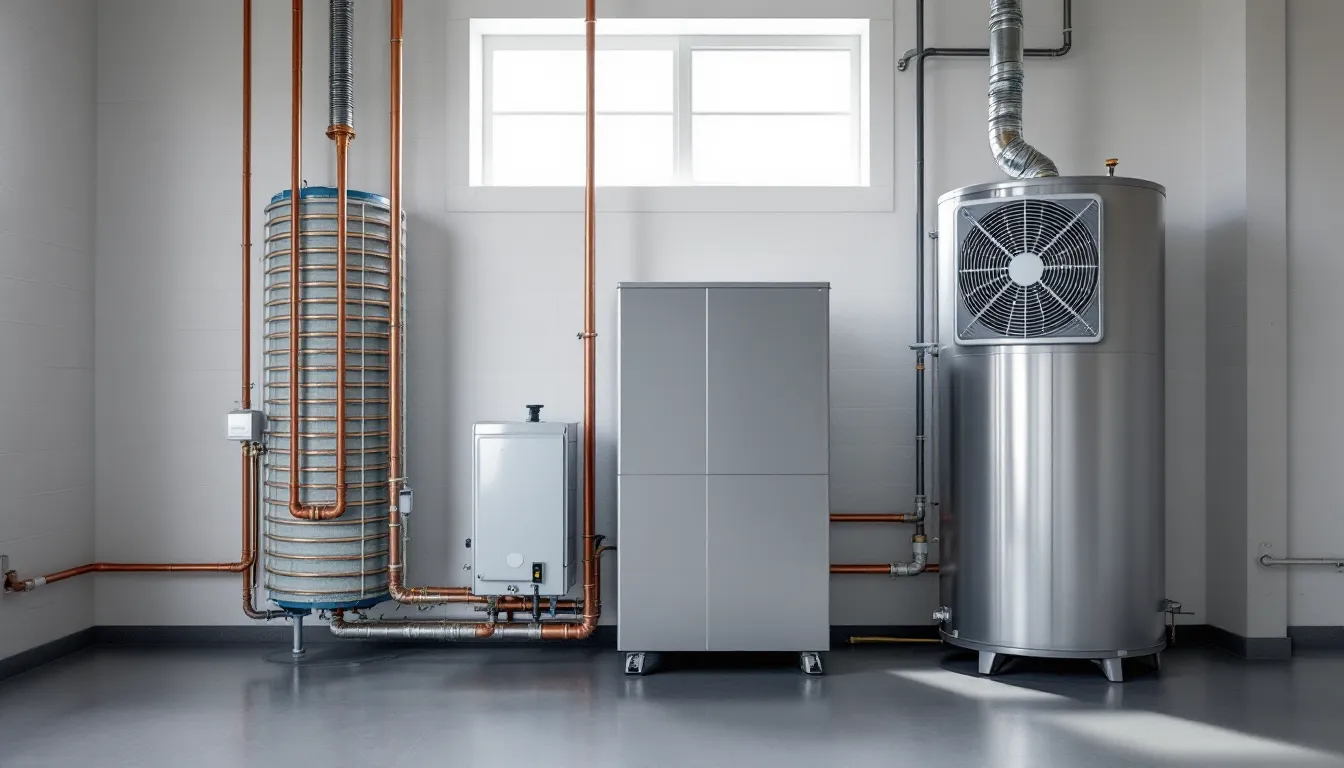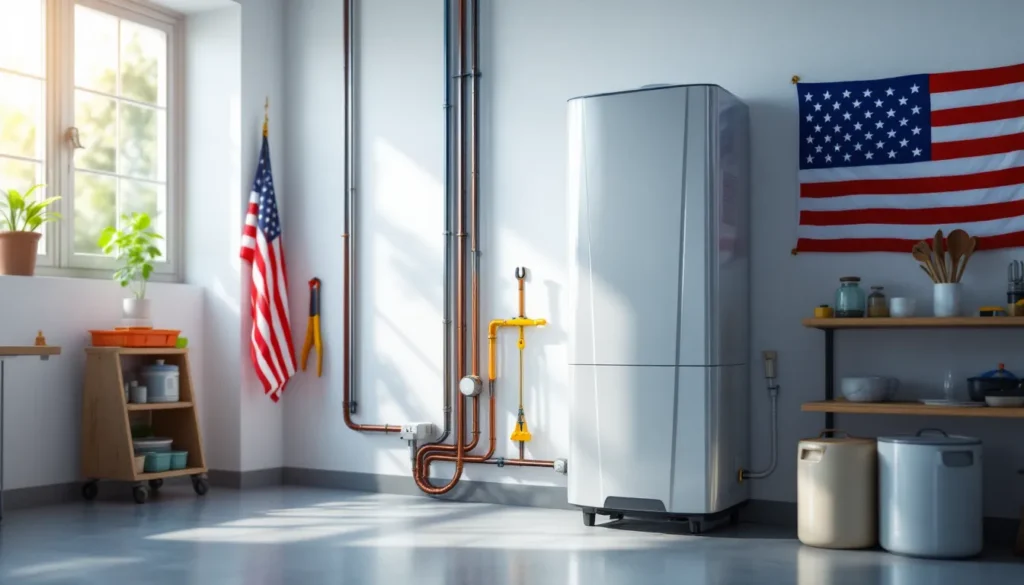Key Takeaways
- Efficient Water Heating: Heat pump water heaters (HPWH) utilize ambient air to transfer heat, making them up to 300% more efficient than traditional electric heaters, resulting in significant energy savings.
- Key Components: The main components of HPWHs include the compressor, evaporator coil, condenser, expansion valve, and storage tank, all working together through a refrigeration cycle to heat water.
- Environmental Benefits: By reducing reliance on fossil fuels and lowering greenhouse gas emissions, HPWHs help decrease your carbon footprint and contribute to a more sustainable home.
- Long-Term Cost Savings: Despite higher initial costs, HPWHs lead to lower monthly utility bills and, combined with potential rebates, can be a cost-effective long-term investment.
- Installation and Maintenance Considerations: Adequate space for air circulation and regular maintenance are essential for optimal performance, while noise levels and climate suitability should also be considered before installation.
- Consistent Hot Water Supply: HPWHs provide a reliable, consistent hot water supply, making them an excellent choice for households with varying hot water demands.
If you’re looking for an energy-efficient way to heat your water, a heat pump water heater might be just what you need. These innovative systems use the ambient air around them to transfer heat, making them a smart choice for both your wallet and the environment. But how exactly do they work?
Understanding the mechanics behind heat pump water heaters can help you appreciate their efficiency and savings. Unlike traditional water heaters that generate heat directly, heat pumps move heat from one place to another, using a refrigeration cycle. This not only lowers energy consumption but also reduces your carbon footprint. Let’s dive into the fascinating workings of this technology and discover how it can transform your home’s hot water system.
Understanding Heat Pump Water Heaters
Heat pump water heaters (HPWH) leverage ambient air for efficient water heating. These systems significantly reduce energy use while providing effective hot water solutions.
What Is a Heat Pump Water Heater?
A heat pump water heater is a device that uses electricity to move heat from the air into a storage tank. Unlike traditional heaters, which generate heat directly, HPWHs absorb heat from the surrounding air and transfer it to water. This process increases energy efficiency, allowing HPWHs to deliver up to three times the hot water for the same electricity.
Key Components of Heat Pump Water Heaters
- Compressor: The compressor circulates refrigerant through the system, raising its temperature as it compresses the gas. This heat is essential for warming the water.
- Evaporator Coil: The evaporator coil absorbs heat from the ambient air. As air passes over the coil, the refrigerant inside it vaporizes and absorbs heat.
- Condenser: The condenser releases the absorbed heat into the water stored in the tank. It transfers heat from the refrigerant back into the water.
- Expansion Valve: The expansion valve controls the flow of refrigerant, reducing its pressure before it enters the evaporator coil.
- Storage Tank: The storage tank holds the heated water until it’s needed. It’s insulated to maintain temperature and reduce heat loss.
These components work together to create an efficient system, providing homeowners with considerable energy savings and reduced environmental impact.
How Does a Heat Pump Water Heater Work?

Heat pump water heaters (HPWH) operate by transferring heat from the surrounding air to heat water, rather than generating heat directly. This method enhances energy efficiency and reduces overall energy consumption.
The Process of Heat Transfer
- Evaporation: The evaporator coil captures ambient heat. A refrigerant inside the coil absorbs this heat and transforms from liquid to gas.
- Compression: The compressor increases the temperature and pressure of the gaseous refrigerant. This step raises the refrigerant’s energy level, preparing it for heat transfer.
- Condensation: The hot refrigerant gas flows to the condenser coil, where it releases its heat to the water in the storage tank, converting back into a liquid.
- Expansion: The expansion valve reduces the pressure of the refrigerant, allowing it to cool before re-entering the evaporator coil to repeat the cycle.
This continuous cycle enables efficient heating of water, utilizing a small amount of electricity to move heat rather than create it.
Energy Efficiency and Performance
HPWHs can provide up to 300% energy efficiency, translating to nearly three times more hot water for the same energy input as traditional electric water heaters. This efficiency stems from their reliance on renewable heat sources—ambient air—reducing reliance on fossil fuels.
In contrast to conventional systems, which convert roughly 90% of input energy into heat, heat pump water heaters optimize energy use, contributing to lower utility bills and a reduced carbon footprint. Regular maintenance, like cleaning the evaporator coil and ensuring proper airflow, maximizes performance and efficiency, thereby extending the lifespan of the system.
Advantages of Using Heat Pump Water Heaters
Heat pump water heaters (HPWH) offer several advantages that make them an appealing choice for households seeking efficient hot water solutions.
- Energy Efficiency
Heat pump water heaters operate at up to 300% efficiency, providing three times more hot water for the same electricity compared to conventional electric heaters. This efficiency leads to reduced utility bills, saving you money in the long run.
- Lower Environmental Impact
By utilizing ambient air for heating, HPWHs contribute to a smaller carbon footprint. They significantly decrease greenhouse gas emissions compared to traditional water heaters, aligning with eco-friendly practices.
- Cost Savings
Though the initial purchase price of an HPWH may be higher, the long-term savings on energy bills often offset this expense. Incentives and rebates may further lower upfront costs, making them a cost-effective option.
- Longevity
Heat pump water heaters typically have longer lifespans than conventional models. With proper maintenance, many HPWHs can last over 15 years, enhancing your return on investment.
- Versatile Installation
HPWHs can be installed in various locations, including basements, garages, or utility rooms. Their design allows for flexibility in placement, which can maximize space in your home.
- Maintenance Alerts
Many modern HPWHs come equipped with smart technology that notifies you of maintenance needs. This feature keeps your system running smoothly and efficiently, helping to extend its lifespan.
- Consistent Hot Water Supply
HPWHs provide a reliable supply of hot water, thanks to their efficiently designed storage tanks. The ability to cycle more hot water ensures that you never run out during peak demand times.
By understanding these advantages, you can make an informed decision regarding water heating solutions that benefit both your household and the environment.
Limitations and Considerations
Heat pump water heaters (HPWH) come with several limitations and key considerations that influence your decision to install one.
- Installation Space: HPWHs require adequate space for air circulation. You might need at least 1,000 cubic feet of surrounding air for optimal operation. Restricted air access can compromise efficiency and performance.
- Climate Suitability: While HPWHs function effectively in moderate climates, their efficiency decreases in colder temperatures. In areas where winter temperatures drop significantly, consider hybrid models that incorporate traditional heating methods.
- Noise Levels: HPWHs generate noise during operation. Units often produce sounds similar to a refrigerator and might cause disturbances in quiet settings. Evaluate your installation location in relation to living areas to minimize disruption.
- Higher Initial Costs: The upfront investment for HPWHs typically exceeds that of traditional water heaters. It’s essential to factor in both installation costs and potential state or federal incentives to assess long-term savings.
- Electricity Dependency: While HPWHs are energy-efficient, they rely on electricity to operate. In the event of a power outage, hot water supply can be interrupted. Ensure alternative solutions are in place if reliable electricity is a concern.
- Maintenance Requirements: Regular maintenance is crucial for optimal performance. Besides cleaning the evaporator coil, you should also check and replace filters as needed. Neglecting maintenance can lead to decreased efficiency over time.
- Heating Capacity: HPWHs may have limitations in terms of recovery rates. If your household uses significant amounts of hot water simultaneously, select a unit with sufficient capacity to meet peak demand.
By weighing these limitations and considerations, you can make an informed choice about incorporating a heat pump water heater into your home.
Conclusion
Heat pump water heaters offer a smart solution for efficient home hot water needs. By harnessing ambient air to heat water, these systems not only reduce energy consumption but also lower your utility bills. With their impressive energy efficiency and eco-friendly benefits, HPWHs stand out as a long-term investment for any household.
Regular maintenance ensures that your heat pump water heater continues to perform at its best. By considering the unique needs of your home and weighing the factors discussed, you can make an informed choice that aligns with both your budget and environmental goals. Embracing this technology could lead to significant savings and a more sustainable lifestyle.

Hi, I’m Md Rofiqul, a gardening enthusiast who loves spending time in the garden and backyard. I enjoy caring for plants, growing flowers and vegetables, and creating a green space that feels peaceful and refreshing. Gardening is more than just a hobby, it’s a passion that connects me to nature and brings joy to my daily life. Living with plants inspires me to embrace simplicity, patience, and sustainability while making every day more colorful and rewarding.
